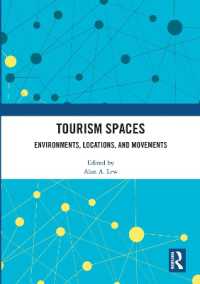- ホーム
- > 洋書
- > 英文書
- > Literary Criticism
基本説明
A Comparative History of Literatures in the Iberian Peninsula is the second comparative history of a new subseries with a regional focus, published by the Coordinating Committee of the International Comparative Literature Association. As its predecessor for East-Central Europe, this two-volume history distances itself from traditional histories built around periods and movements, and explores, from a comparative viewpoint, a space considered to be a powerful symbol of inter-literary relations. Written by an international team of researchers who are specialists in the field, this history is the first attempt at applying a comparative approach to the plurilingual and multicultural literatures in the Iberian Peninsula.
Full Description
A Comparative History of Literatures in the Iberian Peninsula is the second comparative history of a new subseries with a regional focus, published by the Coordinating Committee of the International Comparative Literature Association. As its predecessor for East-Central Europe, this two-volume history distances itself from traditional histories built around periods and movements, and explores, from a comparative viewpoint, a space considered to be a powerful symbol of inter-literary relations. Both the geographical pertinence and its symbolic condition are obviously discussed, when not even contested.
Written by an international team of researchers who are specialists in the field, this history is the first attempt at applying a comparative approach to the plurilingual and multicultural literatures in the Iberian Peninsula. The aim of comprehensiveness is abandoned in favor of a diverse and extensive array of key issues for a comparative agenda.
A Comparative History of Literatures in the Iberian Peninsula undermines the primacy claimed for national and linguistic boundaries, and provides a geo-cultural account of literary inter-systems which cannot otherwise be explained.
This volume is part of a book set which can be ordered at a special discount: https://www.benjamins.com/series/chlel/chlel.special_offer_chlip.pdf
Contents
1. Editor's Preface; 2. Section I. Discourses on Iberian literary history; 3. The European horizon of Peninsular literary historiographical discourses (by Cabo Aseguinolaza, Fernando); 4. Historiography and the geo-literary imaginary: The Iberian Peninsula: Between Lebensraum and espace vecu (by Dominguez, Cesar); 5. Section II. The Iberian Peninsula as a literary space; 6. Introduction: The Iberian Peninsula as a literary space (by Feldman, Sharon); 7. Identitarian projections: Between isolationism and reintegrationism; 8. The hidden history of tripartite Iberianism (by Harrington, Thomas); 9. On Lusism and Lusofonia: From identitarian reinforcement to the mapping of difference (by Cavalcante Padilha, Laura); 10. Travel writing (by Fernandez Cifuentes, Luis); 11. Cities, cultural centers and enclaves; 12. Empires waxing and waning: Castile, Spain and American exceptionalism (by Ugarte, Michael); 13. Bilbao and the literary system in the Basque Country (by Kortazar, Jon); 14. Contemporary Catalan literature: Fact or friction? (by Keown, Dominic); 15. Literary and cultural production centers in Galicia (1840-1936) (by Tarrio Varela, Anxo); 16. Cities, cultural centers, and peripheries; 17. From Iberia to Africa: The construction of a literary city (by Mata, Inocencia); 18. Southern Spain (by Fontanella, Lee); 19. The Canaries: Between mythical space and global drift (by Westphal, Bertrand); 20. Insulated voices looking for the world: Narratives from Atlantic Islands (Cabral do Nascimento, Joao Varela, and Joao de Melo) (by Salgueiro Rodrigues, Ana); 21. Section III. The multilingual literary space of the Iberian Peninsula; 22. Introduction: Multilingualism and literature in the Iberian Peninsula (by Lopez Garcia, Angel); 23. Bilingualism and Diglossia in Medieval Iberia (350-1350) (by Wright, Roger); 24. The impact of Arabic diglossia among the Muslims, Jews and Christians of al-Andalus (by Angeles Gallego, Maria); 25. The Jewish Literature in Medieval Iberia (by Gomez-Aranda, Mariano); 26. The Latin language, a European linguistic continuum: The Hispanic-Portuguese contribution. (by Estelles Gonzalez, Jose Maria); 27. Galician-Portuguese as a literary language in the Middle Ages (by Videira Lopes, Graca); 28. Castilian and Portuguese in the sixteenth century (by Marcos de Dios, Angel); 29. Literary language and diatopic variation: Catalan literary cultures (by Salvador, Vicent); 30. Basque as a literary language (by Rotaetxe, Karmele); 31. Ideology and image of Peninsular languages in Spanish literature (by Romo Feito, Fernando); 32. Section IV. Dimensions of orality; 33. Introduction to Dimensions of orality (by Diaz-Mas, Paloma); 34. Comparativism and orality: Critical approaches to the ballads of La boda estorbada (The thwarted marriage) (by Diaz-Mas, Paloma); 35. Epic and ballad in the Hispanic tradition (by Armistead, Samuel G.); 36. The traditional Iberian lyric of the Middle Ages and the Golden Age: A comparative view (by Frenk, Margit); 37. Linguistic borders and oral transmission (by Luis Forneiro, Jose); 38. Iberian traditions of international folktale (by Manuel Pedrosa, Jose); 39. Literature and new forms of orality: Invisible realities (by Diaz G. Viana, Luis); 40. Section V. Temporal frames and literary (inter-)systems; 41. Introduction: Temporal frames and literary (inter-)systems (by Gomez Redondo, Fernando); 42. Building a literary model: Prose in the court of Alfonso X (1252-84) (by Gomez Redondo, Fernando); 43. Literature at the crossroads of politics: Spain and Portugal, 1580 (by Brandenberger, Tobias); 44. The court of the Catholic Monarchs (1474-1504), or the break in the equilibrium among Peninsular languages (by Lama de la Cruz, Victor de); 45. Theatrical repertoire models in Portugal: Conflict and circulation (1737-93) (by Bello Vazquez, Raquel); 46. The Spanish literary system in the nineteenth century (by Romero Tobar, Leonardo); 47. The dialogue of Iberian literary nationalisms (by Mainer, Jose-Carlos); 48. The shifting systems for literary creation in the novel during the transition and democracy (1975-82) (by Pope, Randolph D.); 49. References; 50. Index








